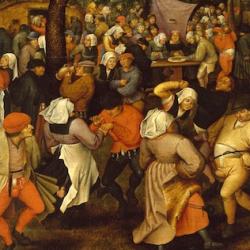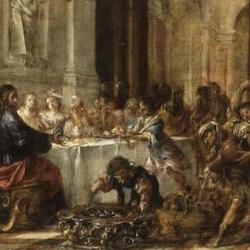John 17 may provide some basis for developing the holiness of God along perichoretic lines. Jesus prays in vese 17-19 that the disciples would be sanctified. Jesus sanctifies Himself, so that the disciples too might be sanctified. The means by which the disciples are sanctified is through the “truth,” which Jesus equates with “Your word.” Sanctification is also connected to mission. The disciples sanctified by the word/truth of God are sent into the world as was the Holy Son sent from the Father. Now, if we take “word” here in the sense of John 1:1, and “truth” in the sense of John 14:6, then Jesus is claiming to be the Word-Truth of the Father who sanctifies the disciples. (Perhaps we should take “word” in 17:14 also as a reference to Jesus Himself.)
Moving to the next paragraph of the passage, Jesus speaks of the disciples as the dwelling place of the Son (v. 23). Through Jesus’ indwelling of the disciples, the Word of God dwells in the disciples to sanctify them. Further, this perichoretic union of Jesus and the disciples is an image of and is rooted in the perichoretic unity of the Father and Son: “you are in me and I am in you” (v. 21), and the unit of the disciples is like the unity of Jesus with the Father (“that they be one as we are one,” v. 23). If the presence of the Word in the disciples “sanctifies” the disciples, then perhaps we might say that the presence of the Father in the Son sanctifies the Son, and the presence of the Son in the Father sanctifies the Father. This makes sense particularly if we follow Thomas Weinandy in suggesting that the Spirit is the agent of the perichoretic union. Through the Holy Spirit, the Son indwells the Father to consecrate Him, and vice versa.
This would also make sense of the mutual glory that Jesus talks about at the beginning of the prayer: “Glorify Your Son, that Your Son may glorify You” (v. 1). Glory and sanctification are closely linked in the OT; the glory of the Lord consecrated holy spaces. Jesus is the Holy Space of the Father because He has received the glory of the Father in the Spirit; the Father is the temple of the Son because the Son dwells in Him in the glory of the Spirit.
This is all an effort to connect the doctrine of God’s holiness to the OT uses of holiness. Though it is clear that God is holy in Himself, most of the OT usage of “holiness” terminology has to do with created things that are consecrated by the indwelling presence of God in glory. I’m suggesting this as a way to show that holiness is necessarily a Trinitarian attribute, much as Ralph Smith has pointed to the Trinitarian character of righteousness.














